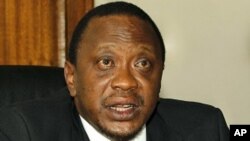In Kenya, debate has been sparked about countrywide prayer meetings held before and after six high-profile suspects traveled to The Hague in connection with post-election violence charges. Organizers say the prayer meetings were attempts to sow peace among Kenyans, while critics contend they were thinly-disguised political rallies that will grow in frequency as the 2012 election date draws nearer.
There was a hero's welcome for Deputy Prime Minister Uhuru Kenyatta and suspended Higher Education Minister William Ruto, two of six people accused of masterminding violence in late 2007 and early 2008 that killed more than 1,000 people.
At prayer meeting was held in downtown Nairobi's Uhuru Park on the day the suspects returned to Kenya, in mid-April, from their appearances at the International Criminal Court.
The event was organized by the Federation of Evangelical and Indigenous Christian Churches of Kenya.
"We had thought about having a national prayer day because of the issues that are taking place in our country, owing to the fact that, after the post election violence, this country needs what we call peace, national healing and reconciliation," explained Bishop Joseph Methu, the group's National chairman.
He says his group allocated one hour to praying for the victims of post-election violence - including thousands who still live in camps after fleeing the violence - and that justice prevail in the ICC process. But speeches continued after the official prayers.
The event was one of a flurry of prayer meetings, conducted mostly before the six suspects headed to The Hague in early April. They face various charges related to planning, implementing, and funding the violence. One particularly high-profile session involved Uhuru Kenyatta's mother - former First Lady "Mama Ngina" - laying hands on her son and Ruto.
Public prayers have also been conducted for some of the other suspects, who include former minister of industrialization Henry Kosgey, Cabinet Secretary Francis Muthaura, former police chief Mohammed Hussein Ali and broadcaster Joshua Sang.
Critics charge that these meetings are actually political rallies to lay the groundwork for next year's elections. Widely believed to be high-profile presidential contenders participating have included Uhuru Kenyatta and Orange Democratic Movement leader Raila Odinga.
George Wainaina, chairman of the National Council of NGOs (nongovernmental organizations), says he thinks the prayer meetings are meant to stir up ethnic intolerance. He notes how some politicians, who are primarily from the Kikuyu and Kalenjin ethnic groups, made critical remarks against Odinga, who is from the Luo ethnic group.
"To the average Luo, Odinga is The Man," Wainaina said. "If you talk ill about him, it means that you are kind of talking ill against the Luo. And, the fact of the matter is the average Kenyan cannot differentiate between a person and a policy."
Moses Ikiara, executive director of the Kenya Institute for Public Policy Research and Analysis, notes how Odinga's popularity dropped 10 points in a recent opinion poll and says political speeches made at prayer meetings are largely responsible for the drop.
He also thinks that the pre-Hague prayer meetings were meant to cover the unpredictability of the ICC process.
"It looked as if, if they go there, they may not come back," Ikiara said. "There was a segment of the media that portrayed that kind of issue. So my feeling is that the prayer meetings were meant for these people to say, 'We are going to be back, we'll be still interested in competing for the top leadership of the country, and really asking people to support [them].'"
Ikiara says Kenyans generally think it is too early to campaign for next year's elections, especially when lawmakers have to pass many bills in Parliament to implement the new constitution. He says couching political rallies in prayer meetings is not threatening for most Kenyans and gets the message across.
For the National Council of NGOs' Wainaina, using religion and the support of religious leaders is a powerful political tool.
"When you talk about, 'I'm representing God,' people kind of take it that, 'Yes, you are talking for God' and consequently you have a higher pedestal than another person talking about a political situation,'" he said.
But some clergy say it is not church leaders and prayer meetings that are promoting political agendas.
The Federation of Evangelical and Indigenous Christian Churches of Kenya's Methu says his group has prayed for everyone involved in the post-election violence. He says prayers for the suspects do not mean endorsement.
"There should be no limitation as to which people you should pray for because justice massively failed," Methu said. "The matter of the Ocampo Six is before a court of law. You cannot even comment about it. I do believe justice will prevail."
He calls on the Kenyan government to re-settle displaced people still living in camps and that such post-election violence never be repeated.
Kenyan Prayer Meetings Spark Criticism, Controversy




